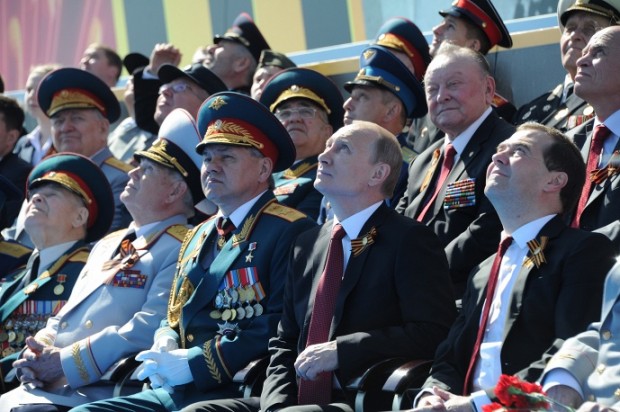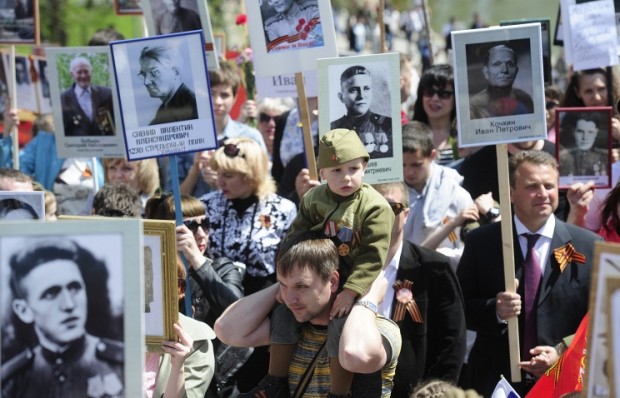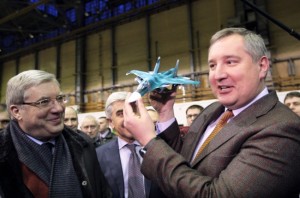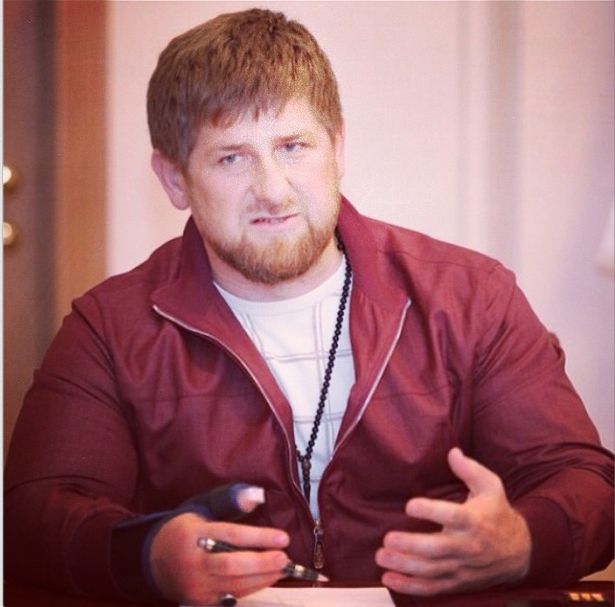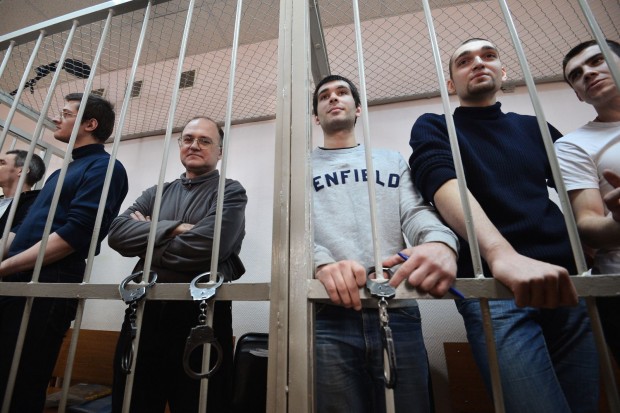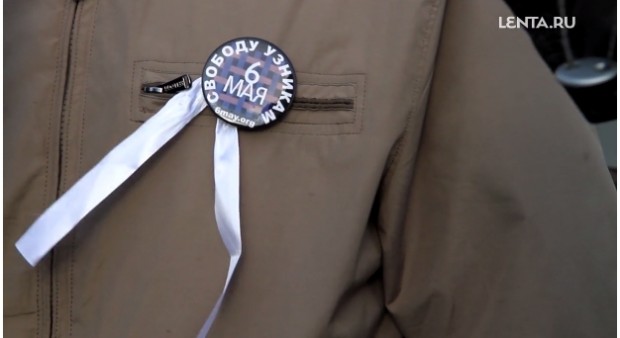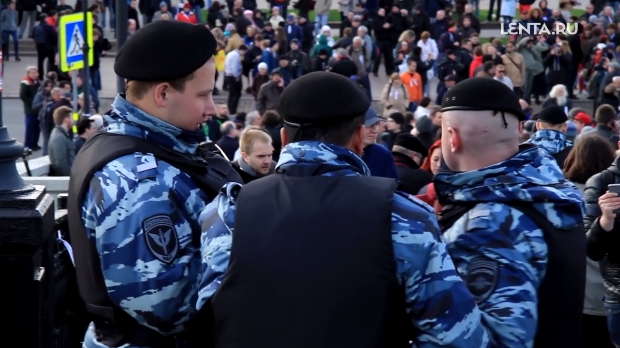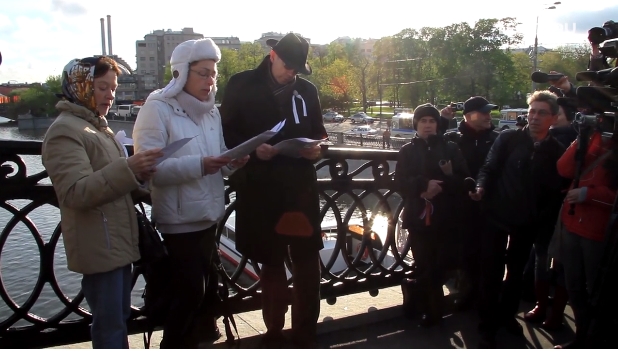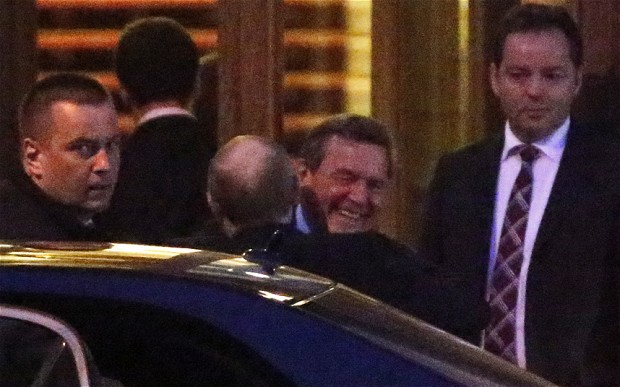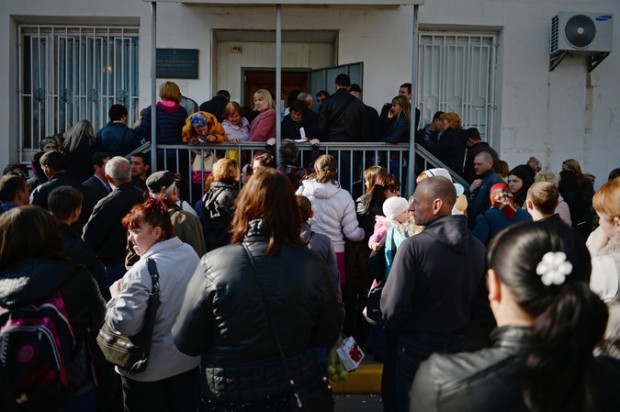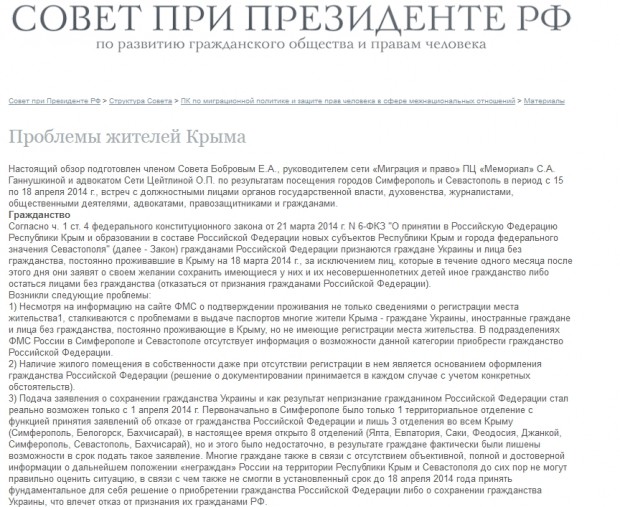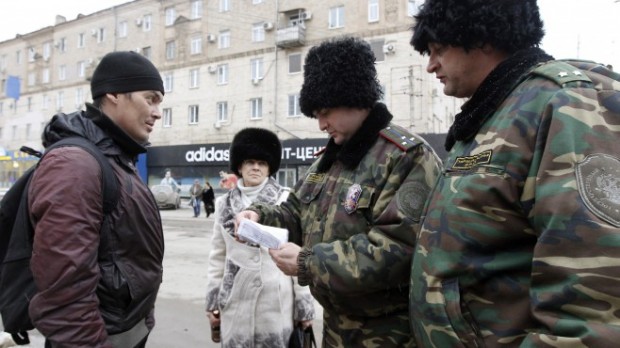Updated Daily. Pussy Riot went to Washington to lobby for additions to the Magnitsky List of Russian official human rights violators. 6 May was the second anniversary of a major opposition demonstration in 2012 in Moscow, where dozens were arrested in clashes with police that activists say were staged by provocateurs. Police detained 13 today who turned out to protest the heavy sentences for eight of the defendants.
Putin’s Presidential Human Rights Council has buried a critical report on the situation in Crimea which reveals estimates of less people voting for the annexation than reported (only 50%) and the occupied peninsula is in chaos as people struggle to obtain Russian passports and international banking, local services and deliveries from Ukraine are disrupted. A Levada poll shows most Russians would prefer economic sanctions or political pressure on neighboring countries to address what they feel is discrimination against fellow ethnic Russians or Russian-speakers. Yet many still yearn for a re-union of the former Soviet republics in a “new state” called the “Eurasian Union”.
For last week’s issue on divergent Russian media coverage of the Odessa tragedy; attacks on Moscow’s LGBT parade, hate signs, and neo-Nazis marching on May Day; corruption, profit loss, and cuts in service at Russian Railways; and connections between fascist groups in Russia and eastern Ukraine, go here:
For the previous issue on ultranationalist Vladimir Zhirinovsky’s rant calling for rape of journalists; NTV’s propaganda campaign against EuroMaidan; new “Snowden Awards” declared in Russia for Internet journalism; restrictive new Internet laws; and the emigration from Russia of top social media entrepreneur Pavel Durov, go here:
Please help The Interpreter to continue providing this valuable information service by making a donation towards our costs.
May 9, 2014
1611 GMT: Russia celebrated Victory Day today, the anniversary of the 9 May 1945 declaration of victory over Nazi German in World War II. The traditional Red Square military parade was held with numerous tanks and armored vehicles and war planes flying overhead. A new armored vehicle, the “Tiger” was wheeled out for display, ITAR-Tass reported — the very same vehicle that ultranationalist Vladimir Zhirinovsky gave to the pro-Russian separatists fighting in Lugansk in a publicity stunt widely covered in Russian media in recent days.
President Vladimir Putin, Prime Minister Dmitry Medvedev and all other officials appeared in St. George ribbons. Here they are watching the air show.
Ukraine crisis: Russian victory parade buoyed by Crimea http://t.co/c7nngGxNEU pic.twitter.com/xnD0sCAYQo
— BBC News (World) (@BBCWorld) May 9, 2014
The forcible annexation of Crimea was widely featured, and parades took place in Crimea as well. Putin traveled later in the day to Sevastopol to greet the crowds.
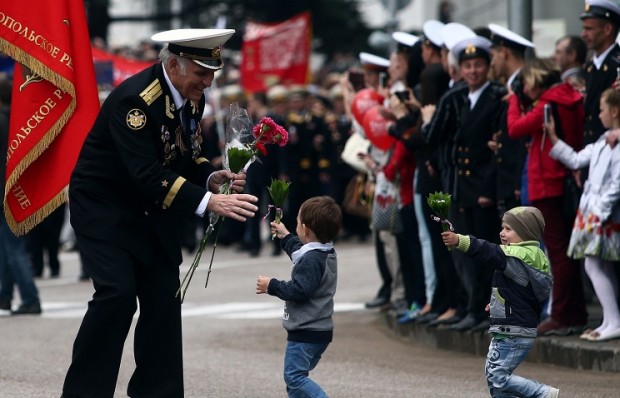
Head of the Black Sea Fleet’s coastal troops Maj. Gen. Alexander Ostrikov. Photo by Stanislav Krasilnikov/ITAR-TASS
The black-and-orange striped St. George ribbons were used on a holiday mass transit card (above) and in TV logos and posters everywhere. Kremlin propagandist Vladislav Surkov is credited with introducing and popularizing the ribbons, once only worn on Victory Day, into anti-opposition patriotic demonstrations starting in 2011; Vice Premier Dmitry Rogozin promoted them in 2012 on Twitter; and today they can be seen everywhere worn by Russian-backed separatists and supporters in cities in the south and east of Ukraine.
http://t.co/6x2sn294 – St.George’s Ribbon stands against the White Ribbon.
— Dmitry Rogozin (@DRogozin) February 27, 2012
Must be Victory Day on the #Moscow Metro. Headed to Red Square pic.twitter.com/ubAWa2xmor
— Kirit Radia (@KiritRadia) May 9, 2014
In a number of cities, a state- staged civic action called “Immortal Regiment” was organized where people came out with posters of their relatives who had died in World War II:
On Red Square the open top Zils are ready for Russia's military bosses. Victory Day parade this morning. pic.twitter.com/HzK6Z6CrGA
— Steve Rosenberg (@BBCSteveR) May 9, 2014
The Russian nationalist extremist groups were particularly enthusiastic about the holiday. Here Edward Limonov, leader of the National Bolshevik Party, greets his followers:
С праздником победы ! Нацболы попали в плен: С праздником великой Победы всех ! Победы в Великой Отечественной… http://t.co/MIgj7GxOUr
— Эдуард Лимонов (@edvlimonov) May 9, 2014
Translation: @edvlimonov Happy Victory Day! The natsbols [nationalist bolsheviks] have been captured: Happy Great Victory to everyone! Victory in the Great Patriotic…
While two of Limonov’s Russian followers and a local sympathizer in Ukraine were arrested by Ukrainian police at the Ukrainian-Russian border last night, there were reports that Zhirinovsky’s armored jeep made it across the Ukrainian border illegally — a report that the extremist politician denied, saying his drivers had legally crossed the border in the vehicle.
1535 GMT: As Victory Day approached, Russian state TV has been filled with aggressive patriotism. A clip of episodes from a popular entertainment show, “Live” with Boris Korchevnikov made by blogger Mikhail Fomenko has been widely shared on social media by Russian intelligentsia critical of its tone. Russia’s famous Tolmachevy Twins made it to the semi-finals in the EuroVision song contest, which was an occasion for wild celebration. One by one, a choreographed parade of various “types” — young, old, simple, intellectual — either famous public figures or people chosen for the studio audience come forward to gush sentimentally about Russia:
The Interpreter has translated some excerpts:
A a middle-aged woman about the Tolmachevy Twins:
“People say our Russian youth is all wrong, they shoot drugs, they drink beer, so thanks to them that they give us the right to say, not only throughout Russia but to the whole world, what kind of youth we have!”
A middle-aged man:
“The main thing is they’ve shown Europe and the world our country. They have shown great Russia, which has such wonderful people, beautiful women, and an excellent people. We are a great country!”
A man from Cameroon speaks in halting Russian to applause:
“The world respects Russia. I have a Russian wife and child. You don’t know what a country this is. Strong. Powerful. And I believe, I believe…Russia will be on its knees…I mean America will be on its knees before Russia!”
A famous folk singer, a large woman in full Russian native head-dress and national costume bursts on the stage, interrupting others, saying “You can’t stop me!” and rhapsodizes about “Central black-earth Russia!” which is the homeland of such fine young women as the singers.
The ultra-nationalist Vladimir Zhirinovsky appears in a robin’s egg blue suit jacket and bow-tie to rhapsodize about the Russian success and advertise his ill-named Liberal Democratic Party of Russia (LDPR). He asks about the twin sisters, “What are their political preferences? When Dmitry Bilan won the EuroVision [in 2006], he became a member of LDPR!” The camera pans to the mock shock of a music critic. Then Zhirinovsky continues to rant, saying it’s terrible the twins have to have to stay in poor, ragged Denmark where people only eat fish and look at “bearded ladies.”
Oleg Roy, a prolific Russian mass paperback writer, comments, “There are people with common sense after all in Europe, and they have judged our girls normally.”
Another middle-aged woman comes forward and earnestly explains the purpose of joining EuroVision:
“The parents at first were opposed to this, because Europe, after all, is other values — bearded men who aren’t men, silicon — you-know-whats with all sorts of accessories — it’s sickening — but today Russia alone, has shown that we must not just fight against their values here, but step on to their platform, and show them our values and revive our values — our girls have brought to Europe chastity — what people have forgotten about there, that word chastity — they have planted that seed. You can convince, you can instill, or you can infect — our task today is to infect…they have fulfilled their mission, they will infect Europe with purity, chastity, spirituality, which they bring, and the main thing is that they came there with a Russian soul…”
The scene seems to be scripted from a well known Russian meme, “The Lullaby” from a famous 1939 Soviet movie, “The Circus,” where a white Russian circus performer falls in love with a black performer and they have a bi-racial child and are discriminated against in their own countries but accepted by the Soviet people. In the scene, the baby is passed around to carefully-depicted representatives of the Soviet peoples of different ethnicities who sing in different languages — a Ukrainian, an Azeri, a Central Asian, etc. and then finally the baby is handed to two Jewish men, one of whom is Solomon Mikhoels, the actor and playwright who makes a cameo appearance and croons to the baby. That scene was removed by Stalin after he had Mikhoels assassinated during his anti-Jewish campaigns but restored versions are now available on Youtube.
May 8, 2014
1630 GMT: An airplane with hardline Russian Deputy Prime Minister Dmitry Rogozin has been blocked from entering Ukrainian airspace today, hvylya.org and other Ukrainian media reported. The Interpreter has translated Rogozin’s tweet:
Оказывается, нам лететь до Кишинева 4,5 часа. Через Болгарию и Румынию. Украина через свое пространство не пропускает) @medinskiy_vr
— Dmitry Rogozin (@Rogozin) May 8, 2014
Translation: @rogozin It turns out that we have to fly 4.5 hours to Chisinau. Through Bulgaria and Romania. Ukraine will not let us through their air space.
Rogozin later tweeted, “It’s good that Ukraine is not Russia, or we’d have to fly around it for 20 hours.”
The nationalist vice premier, infamous for his anti-Western outbursts is Putin’s special representative to Transdnestria, and had earlier announced that he was traveling to Tiraspol to celebrate Victory Day 9 May in Transdnestria.
1414 GMT: Pussy Riot members Mariya Alyokhina and Nadezhda Tolokonnikov, former political prisoners, pushed their main cause — extension of the Magnitsky List of sanctions against Russian officials who have violated human rights — and were covered in Buzzfeed and even the society take-down grudgingly mentioned the names they hope to add on albeit at the end of the article.
The two Russian activists spelled out in detail in Russian on Facebook the message that was sometimes lost in the translation in a Washington preoccupied with the Washington Correspondents’ Dinner and Ukraine (Pussy Riot said they had no comment on Ukraine, as it is up to the Ukrainian people to decide their future, and hoped for elections to proceed 25 May). The Interpreter has translated some excerpts:
“For a Bolotnaya sanctoins list, for freedom of political prisoners in the USA, and in defense of the rights of Russian police:
o Vladimir Kolokoltsev, commander of the operation for the forcible dispersion of the Bolotnaya Square demonstration
o Aleksandr Bastrykin, head of the Investigative Committee and in charge of the Bolotnaya case; he is also said to own property in Czech Republic
o Officials who worked under Bastrykin: Gurevich, Gabdulin, Grin, shchukin and Ranchenkov, who investigated the Pussy Riot case;
o Judges involved in political cases: Moskalenko, Nikishina, Dudar, Solopova, Karpov (Magnitsky, Bolotnaya, Navalny), Syrova (Pussy Riot) and Milinchuk (Vitishko, the jailed environmentalist)
o Heads of colonies were Pussy Riot members were held and fought for basic human rights – Ignatov (Corrective Labor Coloney No. 28, Perm Territory) and Kupriyanov (No. 14, Mordovia).”
The Pussy Riot activists also point out an overlooked “message” from Putin — while businessman Mikhail Khodorkovsky was amnestied before the Sochi Olympics on 20 December 2013, Vitishko was sentenced to 3 years.
The activists explained why they had added to their appeal for policemen’s rights; a draconian edict issued by Putin recently barring law-enforcers from traveling abroad, evidently in an anti-corruption measure. The move has sparked massive police and public anger as one of the things Russians treasure is the right to leave and return to their country, won after the collapse of the USSR.
“When I was imprisoned in my Mordovian colony, my boss would often ask me, ‘Why aren’t you defending our rights, the rights of officials?! They are also constantly violated.’ And we decided to defend the rights of the police. Therefore, we propose including in the sanctions list above all Minister Kolokoltsev, and thus make him unable to travel abroad. A real commander should remain alongside his subordinates. Thus, likely, it will be easier for him to put himself in their place and figure out if he is ready to vacation in Siberia.”
The spectacle of the controversial punk rockers with greying Congressmen drew some jokes on Twitter:
70 year old Senator Ben Cardin has now said "pussy" three time in a press conference. #PussyRiot
— BuzzFeed Benny (@bennyjohnson) May 6, 2014
.@igorbobic @ElaheIzadi Think we'll stick to pushing for global human rights and working to expand #Magnitsky sanctions on violators.
— Senator Ben Cardin (@SenatorCardin) May 7, 2014
Good mtg w/ members of #PussyRiot today. They know what needs to be done to ensure rule of law in #Russia pic.twitter.com/iyj3u3XDxK
— Senator Ben Cardin (@SenatorCardin) May 6, 2014
1359 GMT: So Pussy Riot goes to Washington — and seems to have had a bad hair day — and commit any number of fashion faux pas, at least according to a snarky society writer on their efforts to fit in at various fashionable parties during the week of the White House Correspondents’ Dinner.
America is unkind to its celebrities after falling in love with them (see Justin Bieber). Pussy Riot seems to have passed through the stage of exotic foreign martyrdom as symbols of the struggle against hated patriarchal religious conservatism which so resonates at home, and has now emerged looking for support from US government officials and law-makers who are the very targets of American progressives — which winds up making Pussy uncool.
No matter, these gals are very deft at political messaging and they’ve figured out how to pick three causes that ensure that they stay on message with their core cause (adding to the Magnitsky List of officials implicated in human rights violations, improvement of prison conditions, and freedom for political prisoners in Russia) but also gain the “balance” craved by US liberals by adopting the cause of an “American political prisoner” and — for good measure, to help avoid harassment and hate at home — promoting “the rights of police officers in Russia.” Makes a nice set.
To be sure, the American prisoner, Cecily McMillan — a 25-year-old Occupy Wall Street activist found guilty of striking a police officer — committed a different kind of offense than even Pussy Riot did, in the oppressive Russian context, did they burst into a church and sang a song offensive to believers asking the Holy Mother of God to “take Putin away”. The Russian women were temporarily trespassing and at the most should have gotten a few weeks in jail for “hooliganism,” but with the role of the Orthodox Church increasing in Russian autocracy, and Putin personally offended by opposition sentiment, they wound up with multiple-year sentences and were freed only near the end of their sentence.
Occupy, meanwhile, was camped out in a public square for months on end with increasing problems of crime and trash and neighbors complaining of noise and finally the city fathers ordered the police to disperse the protesters who refused to live — urban camping is not guaranteed under the First Amendment. What happened in this case as seen in a widely-viewed video is not clear; McMillan testified that she was drinking to celebrate St. Patrick’s Day and went to meet a friend at the Occupy encampment where she became involved in an altercation with police. Yet with good lawyers, and numerous human rights and protest groups on the case, the demonstrator may reduce her sentence and make her appeal successfully — it’s all too routine in New York for cops to start with a “assault of an officer” and force plea-bargaining down from there without any evidence of any assault at all; in this case the district attorney refused to accept a plea for a misdemeanor.
Pussy Riot, by contrast, faced a far worse ordeal in the Russian justice system where lawyers could do little and the NGOs and press was muffled. Pussy Riot made it clear they’re not just reaching back for methods from the Soviet era, when Kremlin apparatchiks called for convicted felon Angela Davis to be freed every time anyone raised prisoners of conscience Andrei Sakharov or Natan Sharansky; they support Occupy as a call, and felt that “Capitol Hill” was a phrase that could easily be understood as “Capital Hell,” as they put it.
May 7, 2014
1838 GMT: Our Ukrainian Liveblog has a story today about long-time Russian ultra-rightist activist Aleksandr Barkashov caught by the Ukrainian SBU (Security Service) talking to a Russian-backed separatist leader in Slavyansk. The conversation vividly conveys the impression also articulated by another ultrarightist, Aleksandr Dugin, that such neo-Nazi forces at home and in Ukraine are trying to force Putin’s hand and create “facts on the ground” together — as Crimean self-declared leader Sergei Aksyonov advised — for him to have to take action in Ukraine.
The flamboyant extremist Vladimir Zhirinovsky has also gotten into the act, dressing up in a combat outfit and announcing a gift to Russian-backed separatists in Lugansk.
In the video, Zhirinovsky demonstrates all the modern features of a new Russian-manufactured armored car which he is giving to Russian fighters in Lugansk. He says it can extract itself from jams and repel bullets “no worse than a Hummer.” The vehicle is stamped with the Russian letters “LDPR,” the initials of his ill-named “Liberal Democratic Party of Russia” — which he said can now serve to stand for “Liberal Democratic Party of Republic of Lugansk” or any other region in Ukraine — or Transdniestria.
“It’s really going to come in handy, and I am gladly making a gift of it,” said Zhirinovsky. He intends for the vehicle to be on the border of Ukraine this afternoon and be picked up by drivers from Lugansk.
Reporters wondered how the drivers would cross the border with a combat vehicle, but Zhirinovsky believes that it will get through ordinary border checkpoints without any problem.
At one point Zhirinovsky turns to an aide because he can’t remember the name of “our big friend, the people’s governor” of Lugansk – Valery Dmitrievich Bolotov.
Zhirinovsky also pledged to give a free Volga car to any “soldier, officer or citizen who is the first to break through to Kiev at some stage and plant a Russian flag on the Verkhovna Rada” (parliament of Ukraine). He added that the Volga would be the newest off the line at a Russian factory, just like the one Brezhnev rode in, but “with an American engine.”
1746 GMT: Chechen leader Ramzan Kadyrov announced today that allegedly no Chechens are currently fighting in Ukraine, Kommersant.ru reported, citing Kadyrov’s Instagram account. But the Chechen strong-man threatened to send tens of thousands of Chechen “volunteers” to the south of Ukraine if the “junta” in Kiev continued its “punitive operations.”
Kommersant only carried part of Kadyrov’s statement, leaving out the threat to send volunteers to Ukraine. The Interpreter provides a full translation of Kadyrov’s Instagram post:
“There are no Chechen battalions in Ukraine. The ruling junta wants to write off its punitive operations in Slavyansk on the presence among the defenders of the city of Chechen battalions. This is absurd!. If they were there, I assure you, those who make such statements would have long ago run not only from Slavyansk but even from Kiev which essentially they don’t govern. I urge [Ukrainian Interior Minister] Arsen Avakov and others to calm down, seeing in every dark-skinned person a Chechen and shuddering when they pronounce that word. If a person is dark-skinned, that does not mean that he is necessarily a Chechen. He should know that there are blue-eyed and blonde and even red-haired Chechens. As the Russian proverb has it, ‘fear has big eyes.’
We don’t have the aim of fighting in Ukraine, but we are not indifferent to what is happening in that country. We want to help the Ukrainian people and reinforce friendly relations with them. It’s important for the Ukrainian authorities to stop the violence against the civilian population in the south-east of Ukraine. They will not achieve anything by punitive actions. You have to know how to talk to people and make decisions, taking into account their opinion, and not act blindly under dictation from the West. I have given Zaur Hizriyev, head of Grozny the assignment of visiting Slavyansk and meeting with the leadership in order to sign an agreement on brother cities. There are tens of thousands of volunteers in Chechnya who are ready to help those who are being abused by fascistic thugs, whose blood is being shed by the unlawful government of Kiev. And if the Chechens really go to Slavyansk and other cities, you will see how people like Avakov flee from there, and will not stop even at the Western border of Ukraine.”
Yesterday Ukrainian commanders conducting an anti-terrorist operation in Slavyansk told reporters that they believed there were “foreigners” fighting in the area, and added that they were “Chechens” (see statement at 1:12)
The Interpreter has translated the excerpt of the video uploaded by the Ukrainian Interior Ministry:
“Second commander: I want to say that we are dealing with very well-organized and well-prepared people, who are armed with grenade-launchers, mortars and machine-guns and are very well-trained. I would say from their outward appearance they are far from Slavic ethnicity, I would say…including…
First commander: Speak frankly, Chechens are present here.”
Russian anti-terrorist forces killed 255 terrorist suspects in punitive operations last year and already 78 in the first quarter of this year, among the largest number in the world. Each month dozens of people are arrested and some killed in anti-terrorist sweeps in Dagestan as well as Chechnya. Kadyrov has presided over a ruthless regime of terror in his republic, and has been placed on the Magnitsky List of sanctions against massive human rights violators by the US government.
1657 GMT: Not surprisingly given all the other recent restrictions on speech these days, a Russian legislator has called to ban the Belarusian rock group Lyapis Trubetskoi, which gained fame in the region when its “Warriors of Light” went viral as the EuroMaidan protest anthem. It’s a position with support from Dmitry Agranovsky, a prominent lawyer and popular Communist Party of Russian Federation (KPRF) politician (39,000 followers on Twitter) who defends leftist activists in court cases:
Депутат предложил запретить группу "Ляпис Трубецкой" в России http://t.co/mN0lU3kt4a
Все рок-группы, поддержавшие майдан, надо запретить.
— Дмитрий Aгрaновский (@Agranovskiy) May 7, 2014
Translation: @Agranovskiy A deputy proposes banning the group Lyapis Trubetskoi in Russia; All rock groups supporting Maidan should be banned.
Roman Khudyakov from the ill-named Liberal Democratic Party of Russia has sent a request to Yury Chaika, Prosecutor General of Russia, to investigate the band members’ statements at a recent concert in Izhevsk. Supposedly the group members shouted “Glory to Ukraine!” and called some of the unhappy members of the audience “imperial imbeciles, RIA Novosti reports.
Earlier Pskov Communists had called for cancelling a concert in Pskov for the rock group’s alleged support of “the state coup in Ukraine”.
1657 GMT: Here’s a round-up of past reporting and translations from The Interpreter on the Bolotnaya Square Demonstration of 6 May 2012 and the people arrested and charged with incitement of riots that day. Human rights defenders and opposition activists claim the charges were fabricated and judges refused to look at evidence of how the violence was staged by provocateurs. The demonstration was the first major opposition rally after Putin’s re-election as president 4 March 2012, and brought figures like anti-corruption blogger Alexey Navalny to even further prominence. Subsequent protests at the trial of the defendants led to another round of detentions, and house arrest for Navalny as he was facing trial on other charges also said to be fabricated.
Report from Original 6 May 2012 Demonstration on Bolotnaya
Speech by Alexey Navalny on Bolotnaya Square
Bolotnaya Suspects Refuse to Plead Guilty
Violent Provocations on Bolotnaya Square
Sentencing of Konstantin Lebedev in Bolotnaya Protest
Russian Novelist Boris Akunin on 1st Anniversary of Bolotnaya Demonstration
Bolotnaya Defendants’ Lawyer Fears Stiff Sentences as EuroMaidan Prevention
Sentencing of 8 Defendants in Bolotnaya Square Case
1632 GMT: Yesterday police detained 13 people on charges of taking part in an unauthorized rally on the occasion of the second anniversary of the Bolotnaya Square demonstration, news.ru reported. Among them were two journalists, Andrei Zubets, a photo journalist, and Natalya Gorilskaya, a correspondent for Russkaya Riviera, an Italian publication.
В Москве на Болотной площади прошла акция в поддержку политзаключенных pic.twitter.com/yVi4Iz1kLE
— Тот самый Мартин (@martin_camera) May 6, 2014
Translation: @martin_camera In Moscow on Bolotnaya Square an action was staged in support of political prisoners.
According to OVD-Info, the police abuse monitoring group, all the detainees were taken to the Yakimanka police department. Some were charged with lighting smoke bombs and shouting the slogans “Put Putin Gang on Trial!” “Down with Police State” and with hanging banners with the phrases “Russia is Not a Prison” and “Freedom for Political Prisoners”. Some people who held up invisible placards were also arrested.
Police said they would not step up security measures, but the independent news site snob.ru published pictures of waiting police vans:
пока что митинг на болотной ограничивается этим. людей с плакатами уже задержали. pic.twitter.com/I7JDKHtnVI
— Егор Максимов (@egor_mq) May 6, 2014
Translation: @egor_mg For now the rally on Bolotnaya is limited to this. The people with posters were already detained.
Pickets in support of the Bolotnaya prisoners took place in a number of cities around Russia, and a solidarity picket was staged in Kharkiv, Ukraine.
Возле консульства РФ, проходит акция в поддержку узников Болотной pic.twitter.com/GfIEuJHgty
— IT Sector Харьков (@itsector) May 6, 2014
Translation: @itsector Near the RF consulate, an action of support of the Bolotnaya prisoners.
1614 GMT: The Russian opposition marked two years since the 6 May 2012 Bolotnaya Square demonstration yesterday, calling for the release of those arrested and sentenced to long prison terms for allegedly inciting disorders and resisting police officers. On that day, opposition groups angered at Putin’s increasing repression and falsification of election results staged an authorized procession and rally that ended in violence when police blocked a previously-agreed pathway to Bolotnaya Square in Moscow.
Opposition supporters marked the occasion quietly by organizing a “popular stroll,” a custom in Russia where people go out for walks together on holidays. That way they don’t have to obtain a parade or rally permit. Earlier, opposition leaders applied to the mayor’s office for a rally anticipating 30,000 people, but were rejected. As a result, organizers urged supporters to stroll throughout the park at Bolotnaya, but without chanting political slogans or carrying posters. Some people could be spotted wearing ribbons with the words “6 May Freedom for Prisoners”. It was raining for part of the day which cut down on participation. Riot police watched carefully.
Some protesters explained to press that they thought they could get away with wearing t-shirts with slogans, which would not be characterized as violating regulations:
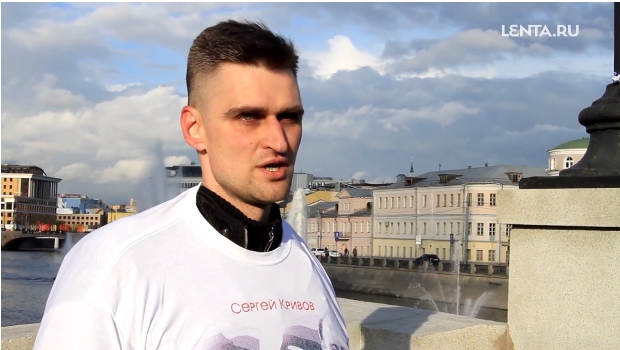
A young man wearing a t-shirt in support of Bolotnaya prisoner Sergei Krivov. Screen grab from Lenta.ru
Others sang a song in support of defendants that they thought would go under the radar:
About a dozen were arrested for throwing smoke bombs and carrying signs.
May 6, 2014
1824 GMT: Clemens Wergin has an op-ed in the New York Times, Why Germans Love Russia, which explains why it is hard to get unified international pressure mounted sufficiently to stop Russian President Vladimir Putin’s aggression against Ukraine. He says there are too many prominent German figures supporting the Kremlin’s narrative:
“According to these august figures — including former Chancellors Gerhard Schröder and Helmut Schmidt — NATO and the European Union were the real aggressors, because they dared to expand into territory that belonged to Moscow’s legitimate sphere of interest. And it seems part of the German public agrees.
You thought that Germans were the champions of international law and a rules-based world order? Think again.
There is a blatant hypocrisy here. At times the same people who had relied on international law to attack the American invasion of Iraq are now, as newborn realists, excusing Russia’s need to infringe on the sovereignty of other nations.
In point of fact, despite its trumped-up charges against Iraq, the Bush administration had at least 16 United Nations Security Council resolutions to support its case. Vladimir V. Putin, Russia’s president, had zero. The only common denominator of both positions seems to be an underlying anti-Americanism.”
The Global Post put it even more starkly:
“While European governments were struggling to agree on the names of a handful of Russians they could blacklist in response to the latest mayhem in Ukraine, one of the continent’s preeminent elder statesmen was out partying with his old buddy Vladimir Putin.”
To be sure, Germany distanced itself from its former leader and also appeased the US by blocking former NSA fugitive Edward Snowden from testifying in person in a German parliamentary NSA inquiry, despite insistence of the Greens and other leftists:
“Opposition party members in the committee from the Left and Green party had for weeks insisted that the former NSA employee was a key witness and therefore would need to appear in person, not least because of concerns that Russia otherwise could influence his testimony.
However, the ruling Christian Democratic and Social Democratic parties, said that a written questionnaire would suffice. The disagreement led to the resignation of the CDU head of the committee this month.”
Of course, there was something inherently contradictory about deciding that Snowden was too compromised if he were inside Russia, where indeed he is under total control of Russian intelligence agencies, yet would make a credible witness outside of Russia. Germany has woken up “from its Snowden binge” says John Schindler, a former NSA employee who currently teaches at the US Naval Academy. Even so, the US and Germany failed to reach a deal on intelligence cooperation during Chancellor Merkel’s recent trip to Washington.
1701 GMT: Russian media has generally been silent about the rumored suicide attempt of Kremlin propagandist Konstantin Ernst. A St. Petersburg TV station PiterTV removed a story about Ernst’s alleged suicide attempt but it is still viewable in Google cache. Only a few sites like Delovoi Kvartal (Business Quarterly) have kept the story posted.
The blog Pericles Chronicle says all news stories are based on a single anonymous source at Channel One and have not been confirmed. Ernst has been reportedly hospitalized with wounds to his neck and tongue.
Эрнст Шредингера http://t.co/Bo2GqVBvmH pic.twitter.com/lpKv3K2nw2
— Перикл (@TV81090721) May 4, 2014
Translation: @TV81090721 Schrödinger’s Ernst.
Новость про попытку самоубийства Эрнста тщательно удалили со всех русских источников, где она вчера появилась, а опровержения так и не было.
— Mikhail Svetov (@msvetov) May 3, 2014
Translation: @msvetov News about Ernst’s attempt at suicide is carefully being removed from all Russian sources where it appeared yesterday, but no rebuttal has appeared.
1639 GMT: In the absence of official press coverage, Russian social media is filled with speculation of the fate of Konstantin Ernst, a famous TV anchor who attempted suicide 30 April after an urgent phone call conference with President Putin and Gazprom CEO Alexey Miller.
LiveJournal blogger Chapaiff says Channel One’s press office has released a statement that Ernst, who was serving as the station’s general director, is “alive and well,” but it is not deemed to be reliable. Ernst reportedly shot himself in the head, wounding his mouth and neck but survived.
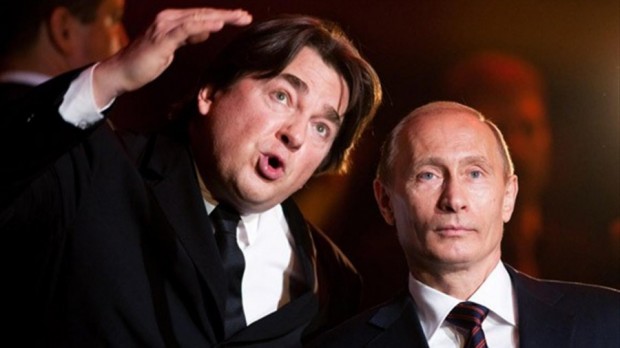
Vladimir Putin and Konstantin Ernst at Eurovision Song Contest in 2009. Photo by Anton Belitsky/Demotix/Corbis.
Ernst became world-famous as creative producer and master-of-ceremonies at the highly-viewed Sochi Olympics opening ceremony.
Russian social media is rampant with speculation that Ernst could already be dead, or that he had some sort of attack of conscience for serving the corrupt Putin regime, or simply that he was depressed and medications weren’t working. Some even believe that he was the victim of an assassination attempt. Whatever the origins of the seeming suicide attempt, the incident is seen as a sign of cracks in the Kremlin’s facade over Ukraine. The Interpreter has translated an excerpt of Chapaiff’s post:
“The collapse of the Kremlin’s foreign policy, numerous failures of Russian intelligence in Ukraine and the freezing of Russian capital in the West — all of this forces Putin to deal harshly with his immediate entourage and to aggravate the barely-calmed struggle of Kremlin groupings for power. The isolation by the West [with the sanctioning] of [Kremlin advisor] Vladislav Surkov and [oil baron] Igor Sechin have disrupted their domestic positions and reinforced the ‘liberals,” whose leader could have been Ernst — as Vlad Listyev [an TV producer assassinated in 1995] once was.”
Some have even gone so far to suggest that Putin and his cronies might end up in the Hague in an international court, and people like Ernst might have testified against them and needed to be eliminated. There is no question of the leading role Ernst has played throughout Putin’s reign as lead visual propagandist. As blogger Juliana Vipiana comments:
“Ernst has been Russia’s visionary leader for nearly two decades. He is Russian president Vladimir Putin’s go-to guy. His prevailing talents have pioneered the visual style of the Putin era. “Ernst is an unmatched figure in Russia’s official culture, where statist boosterism combines with high production values to create the image of a vital nation under one leader—Putin—to whom there is no alternative,” reported the New Yorker. So without a doubt, Putin would choose Ernst to produce one of Russia’s biggest events.”
1603 GMT: Vice has reported on a new “patriotic alphabet” poster being used in Siberia to promote the forcible annexation of Ukraine. The “Polite Alphabet” is named for the phrase “polite people,” used by Russian mass media from a popular song to describe what Ukrainians have dubbed “the little green men” — the Russian military in Ukraine.
The new patriotic #Russian alphabet http://t.co/3ZYjmnCefo #Russia #Siberia #Moscow #Ukraine #Kiev #linguistics pic.twitter.com/q9ur0D6eZm
— Joshua Noonan (@JoshuaNoonan) May 5, 2014
In addition to the “B is for Berkut” or riot police, “A is for Anti-Maidan,” and “P” is for Putin, we can point out a few others from the Russian alphabet:
The Russian tverdiy znak (hard sign) is used for tverdost’ for the Russian word for “firmness” with a picture of Foreign Minister Sergei Lavrov; “Yu” for Yuzhniy Potok or “South Stream,” a pipeline project Russia still hopes to carry out with the EU despite sanctions; “Kh” for khrabost’ or bravery, where the Internet-famous Crimean prosecutor Natalia Poklonskaya is shown; “Ts” for tserkov’ or “church”; and “y” for the Russian letter that should be used to spell the Russian word Krym now instead of Krim as Ukrainians spelled it.
1537 GMT: Pro-Putin propaganda takes many forms, and some of it is designed to seem as folksy as possible. An anti-Maidan YouTube video posted by a Russian poet and composer, Lena Vasilyok, titled “Don’t Go to War, Obama” already has 114,657 views.
In the video, a quaint Russian babushka (grandmother) in an embroidered shawl, calls on “Obamashka” — using the Russian affectionate diminuitive — not to go to war with Russia over Ukraine. Set to the mournful Russian folk tune “The Rowan Tree,” the video pans around a Russian cottage with all the attributes — bubliki or Russian bagels, braided bread with dried apples, old-fashioned family photos, a samovar and hand-crafted pitchers and cups.
In rhyming couplets, the babushka chastises the American president for supporting “fascist brethren” and “Bandera followers” in Kiev and offers to bake him some bliny (pancakes) if he will come to her village, repent and be washed of his sins by the local Orthodox priest. “Reconcile with Vladimir, try, so that all the fascist scum die!” she recites. See the clip with English sub-titles here.
0849 GMT: A report titled Problems of Residents of Crimea prepared by one current and two past members of the Kremlin’s Presidential Council on Human Rights, has been hidden from easy access but is still viewable in Russian on the Presidential Council web site.
The report, based on a trip to Simferopol and Sevastpol 18-25 April by human rights defenders Svetlana Gannushkina, Yevgeny Bobrov and Olga Tseitlina, contains impressions completely at odds with the happy portrayals of official Russian state media about the situation in Crimea since the forcible referendum. The following is a summary by The Interpreter:
o As the New York Times has also reported, tens of thousands of people are lining up to try to regularize their passports — if they have Ukrainian passports, they are ordered to renounce Ukrainian citizenship and apply for Russian passports — or face deportation. As in Soviet times, massive lists are being created and people are buying places in the list.
o Government telephone lines and offices are overwhelmed with calls from panicked people who can’t get answers to their legal questions.
Past laws and new regulations are confusing and contradictory — and above all, punitive. People were given only until 18 April to decide to reject their Ukrainian citizenship and apply for Russian citizenship — although they may not qualify. Failure to apply by the deadline means disqualification for Russian citizenship.
o State employees are threatened with dismissal if they opt to take Ukrainian citizenship.
o Crimean Tatars are being forced to take Russian citizenship, because under Russian law, only citizens can have land titles.
o According to Crimean migration authorities, about 170,000 Russian passports have been issued; according to the Russian Federal Migration Service (FMS), there are about 300,000 as of 19 April. About 1,2000 have renounced Russian citizenship, including only 8-10 Crimean Tatars although the FMS says there are 3,000.
o Refugees have no legal status
o Ukraine has closed access to their data bases of citizenship and real estate ownership, and Russian authorities have also removed online documentation so the real estate market is essentially frozen. This creates a vicious circle as proof of ownership or residence is needed to gain the passport.
The Crimea used to rely on Ukraine for about 30% of its produce. Because prices in the Crimea are much lower than in Russia, after the border controls were removed, merchants from Krasnodar began to buy up all the produce and goods for re-sale in Russia, creating shortages.
The one Ukrainian high school is now ordered to move to classes in the Russian language; the department of Ukrainian and Tatar Philology at the Taurides Federal University is also closing. Russian authorities have essentially liquidated the Kiev Patriarch Orthodox Church, and now churches in Crimea are experiencing problems with property permits. Ukrainian authorities had tolerated the circulation of Hizb-ut-Tahrir and other non-approved Islamic literature; these are banned under Russian law and now “the state bodies of Crimea are turning Islam from a religion into a protest ideology.” Davet, a Muslim community which had previously won a court case under Ukrainian authorities proving that it did not incite religious hatred is now in jeopardy and is being pressured by law-enforcement. Ivan Selentsov, who distributed the Koran in Russia, was detained 16 March, tortured and not allowed access to his lawyer; finally he was drive outside of Crimea to Chongar and threatened not to come back to Crimea for 30 years.
Investigators are saying Reshat Ametov, the Crimean Tatar who staged a silent protest against the “self-defense units” and was abducted on 3 March when he went to join the Ukrainian army, was “in a traffic accident.” Ametov’s bound and blindfolded body was found on 15 March with signs of torture.
The banking system is in chaos and is unavailable for many people; those with accounts established under Ukraine are in danger of losing their savings or payments if they move to Russian citizenship in occupied Crimea; Russian banks cannot perform transactions with Crimea because of Western sanctions which would then cause them to lose their international status. Pensions have not been paid to Ukrainian citizens; Ukraine levies huge penalties on Russian banks.
1719 GMT: A critical report on human rights violations in Crimea, originally posted on the front page of the Russian Presidential Council on Human Rights, has been “censored” because of reporting truthfully about poor turnout in the Crimean referendum Forbes writer Paul Roderick Gregory reports.
But we have found the story is actually more complicated, as the report is still available, isn’t official, and doesn’t make claims of “only 15%” voting for annexation — the figure given is 50%. But clearly it has been removed from view and easy access due to its critical findings on a number of topics.
The report Problems of Residents of Crimea is still available at its original link, and social media links to it still work, but it is no longer on the front page of the web site of the RF Presidential Council for Development of Civil Society and Human Rights, as the controversial Putin showcase for managed civil society “dialogue” is formally known. Instead, a White Book alleging massive human rights violations in Ukraine prepared by Putin’s aides has taken its place. While it is understood that reports age and get pushed down below the fold on a site with news arranged chronologically, the critical report is no longer in the line-up at all.
To be sure, another news notice of Gannushkina’s “Notes on a Visit to Crimea” published in Novaya Gazeta is still in the Presidential Council’s news archive with an excerpt and then a link to Novaya Gazeta. But this article focuses more on citizenship problems, and doesn’t contain any comments about the turn-out for the referendum (see English-language translation by Rights in Russia here).
It’s important to note as well that Problems of Residents of Crimea is not an official report endorsed by the Presidential Council as a body, but only a report submitted from a fact-finding mission of three human rights advocates: Yevgeny Bobrov, lawyer and head of the human rights group Voskhod [Rise-Up], and a current member of the Presidential Human Rights Council; Svetlana Gannushkina, a former member of the Presidential Council and head of Civic Assistance and Memorial’s Law and Migrants program; and an Internet lawyer Oleg Tseytlin. The report is based on their visit to Simferopol and Sevastopol from 15-18 April. The council has been divided on the issue of the Crimea, with most of its members supporting the forcible annexation.
The appearance of something “presidential” seeming to admit that the Kremlin’s claim of “97%” was fake filled the Russian and Ukrainian blogospheres and alternative news sites. And some bloggers began to attack the messengers, calling Gannushkina and the others “fifth columnists” — a phrase re-introduced to Russian lexicon by Putin in his triumphant speech on the annexation of the Crimea.
Forbes‘s portrayal is misleading, because it makes it seem as if “the Presidential Human Rights Council” itself made formal findings, although it is only a current and past members — and it also contains a significant error about the referendum vote:
“To make sure no one misses this:
Official Kremlin results: 97% for annexation, turnout 83 percent, and percent of Crimeans voting in favor 82%.
President’s Human Rights Council results: 50% for annexation, turnout 30%, percent of Crimeans voting in favor 15%.
Putin’s people pulled this “rather unfortunate” report from the President’s Human Rights Council website, but council member Svetlana Gannushkina talked about this subject on Kanal 24 (as reproduced on Ukrainian television), declaring that the Crimean vote ‘discredited Russia more than could be dreamed up by a foreign agent.'”
In fact, the original report by Bobrov, Gannushkina and Tseitlina doesn’t make any statement at all about “15%,” but says the following, based merely on a straw poll of 20 persons interviewed (translation by The Interpreter):
“In the opinion of practically all the specialists and citizens surveyed:
– the overwhelming majority of residents of Sevastopol voted for annexation to Russia at the referendum (turn-out 50-80%); in Crimea, according to various figures 50-60% of voters with a general turn-out of 30-50% voted for annexation to Russia;
– residents of the Crimea voted not so much for annexation to Russia, so much as an end, in their words, ‘to the corrupt lawlessness and thieves’ dominance of the Donetsk proteges.’ Residents of Sevastopol, on the other hand, voted precisely for annexation to Russia. Fears of the unlawful armed formations in Sevastopol were greater than in other districts of Crimea.”
So the human rights defenders’ report indicates turnout is less, but still concedes it could be as high as 50% overall. Forbes’ error is based on the Ukrainian TSN television show, where the numbers and elaborate visualizations are incorrect; Gannushkina is quoted only briefly with a general comment, and does not speak on the issue of the turnout.
May 5, 2014
1719 GMT: As expected, President Vladimir Putin signed into law a package of “anti-terrorist” legislation passed by the parliament last month. These include a mandate for foreign companies to place their servers with Russian citizens’ user data on Russian soil (a measure difficult to enforce); a law equating bloggers were more than 3,000 readers to register as “mass media” and other speech curbs; increased regulation of Internet payment systems; harsher penalties for organizing mass riots; and enhanced capacity to hunt for terrorists and punish them.
Bloggers are still puzzled how they are to measure their “3,000 readers,” but the law enables the government essentially to force any blog they don’t like to apply for media status — and risk rejection. A little-noticed aspect of the law introduces the concept of “organizer of dissemination of information,” which is interpreted by the drafters very broadly, to mean anything from a personal web site to a group on a social network. All media must cooperate with intelligence agencies by keeping records of their users’ metadata for 6 months. Violators of the law can be fined or blocked for a month and ultimately could be banned. The vagueness of the law has prompted a joke on Twitter from a parody account of the Russian Foreign Ministry:
Туалет Казанского вокзала с посещаемостью 15 тыс. чел. в сутки был зарегистрирован как СМИ после появления на стене надписи "ПУТИН – ПИДОР"
— Мuд Роисси (@Fake_MIDRF) April 23, 2014
Translation: @Fake_MIDRF The toilet at the Kazan Station visited by 15,000 people a day was registered as mass media after appearance on the wall of a graffiti, “PUTIN IS A PED0”.
The Internet payments law bars anonymous sending of payments to companies, except for foreign firms, up to 15,000 (US $420), but if the recipient is a physical person (individual), he must show ID, and has a monthly limit of 40,000 rubles ($1,119). An individual may send payments up to 60,000 rubles ($1,679) a day or 200,000 ($5,598) a month but he must show ID, and his recipients must also show ID.
This law could place a chill on fund-raising by NGOs and opposition parties, who have collected donations from individuals showing an e-mail address, which they may have separately linked to a real name and address, by now requiring such persons to give the government their ID.
Under another new law, the FSB now has the right to stop and frisk any citizen and their possessions if they have grounds for suspicion of a criminal or unlawful act, and can also examine their vehicles and contents if they suspect they are being used for unlawful purposes. The move follows a string of terrorist acts in Volgograd before the Olympics, in which a total of 41 people were killed.
The Cossacks are already financially supported and enabled by police to carry out document checks as they did in Volgograd after bombings there.
Also included was a ban on swear language in literature and art, mass media publications or movies and also in concerts or theatrical productions; a prohibition on “insult of the historical memory of World War II” — likely motivated by the controversial poll on the necessity of the Leningrad Blockade which has cost independent TV Rain some of their cable operators. This includes a “Holocaust denial” clause of sorts — for “denial of facts established by the Nuremberg Tribunal,” violators can be punished by a fine up to 300,000 rubles. If the denial is made “with the use of an official position or media,” the punishment is up to 500,000 rubles or imprisonment up to five years. This may have been motivated by a few recent TV talk show hosts and guests who made claims about Jews “bringing the Holocaust on themselves” but it will be interesting to see how it is enforced.
1719 GMT: A recent poll conducted by the Levada Institute (25-28 April) of 1,602 adults in 130 towns and 45 regions of Russia indicate that most Russians (58%) are concerned enough about discrimination against their fellow Russians to want their government to take action, but not enough to advocate forcible annexation (only 15% are in favor). Regarding Ukraine, 66% believe Russian language rights are restricted, and that there is also psychological discrimination (38%) and crude physical pressure (32%) against Russians and Russian-speakers in Ukraine.
A significant number of Russians do not seem willing to translate these concerns into military actions; 41% say “economic sanctions” should be put in place. Only 43% are prepared to vote for a Customs Union of Ukraine, Belarus and Kazakhstan now.
Russians polled ranked the countries where they had the most concerns about the rights of Russians and Russian speakers as follows:
Ukraine 62%
Latvia 53%
Lithuania 48%
Estonia 46%
Georgia 25%
Kazakhstan 12%
Moldova 12%
Azerbaijan 11%
Tajikistan 11%
Uzbekistan 10%
By “discrimination,” most polled (50%) mean a concern about a “ban on official use of Russian” in the Baltic countries (39%) or 47% (Ukraine). Such bans don’t exist and aren’t contemplated, but the Russia state media has whipped up plans the Ukrainian government once had — and scrapped — to strip Russian of its official language status (which wouldn’t necessarily mean a “ban” on Russian in any event). Meanwhile, in Crimea, Sergei Aksyonov, the self-declared head of the Autonomous Crimean Republic, forcibly annexed to Russia, has declared only Russian and the Crimean Tatar language as official state language, leaving out Ukrainian.
Other concerns Russians have regarding their fellow Russians involve “psychological discrimination, insult, threat, persecution, and rudeness,” which was 26% for the Baltics and 38% for Ukraine.
The means that Russians want to use to address these concerns, however, do not favor the kind of forcible annexation used on the Crimea; only 15% support this for other countries and only 8% support “a limited contingent of Russian troops” in other countries. They’d rather use economic pressure (41%), political pressure (34%) and reciprocal actions like deportations (28%).
The authoritarian Vladimir Putin isn’t necessarily going to be guided by public opinion in his actions, but despite the seeming reluctance to go to war for more territories, the Levada poll did capture a Russian theoretical wish for “Russian expansion through territories with compact Russian-language populations” — 41% were in favor, 23% were not. That suggests that if Putin uses even military means that fall short of an actual invasion or an acknowledged presence of troops — as he has been doing in Ukraine — many Russians would be fine with this. And 30% are for “a new state, a Eurasian Union, in which Russia and all the other former republics of the Soviet Union would join”. Interestingly, while 33% of those polled don’t want to join the European Union, 19% do “in the foreseeable future,” a number that must worry the Kremlin.
